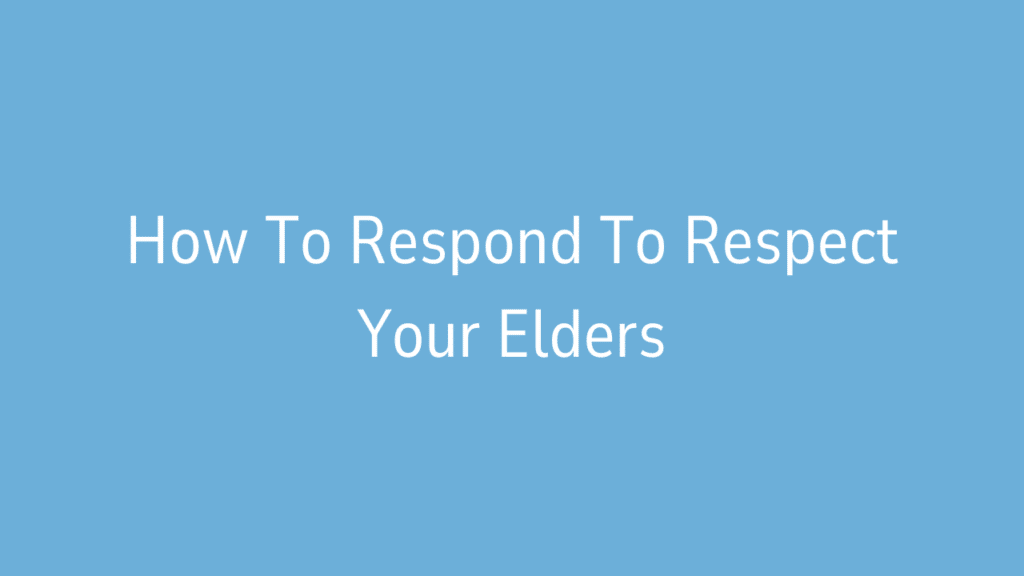The phrase “Respect your elders” is often used to remind younger people to show courtesy and honor toward older individuals. While respecting elders is a common value in many cultures, it can sometimes feel overused, misunderstood, or even misapplied. Whether you hear this advice during a family gathering, a workplace discussion, or a disagreement, knowing how to respond thoughtfully can foster understanding and mutual respect.
In this article, we’ll explore what “respect your elders” means, why it’s important, and how to respond in different situations.
1. What Does “Respect Your Elders” Mean?
Respecting elders generally involves:
- Acknowledging their experience: Recognizing their years of life and knowledge.
- Showing courtesy: Using polite language and behavior.
- Listening to their perspective: Valuing their insights and opinions.
- Providing care: Supporting them emotionally or physically when needed.
While the phrase has positive intentions, it’s important to understand that respect should be mutual, regardless of age.
2. Why Is It Important to Respect Elders?
2.1 They Have Valuable Experience
Elders have often lived through challenges and changes, making their insights unique and helpful.
2.2 It Promotes Family and Social Harmony
Respecting elders fosters stronger relationships within families and communities.
2.3 It’s a Sign of Good Character
Showing respect reflects maturity, kindness, and emotional intelligence.
2.4 Cultural Expectations
In many cultures, respecting elders is a deeply rooted tradition that reflects values and heritage.
3. When You Might Hear “Respect Your Elders”
3.1 During a Family Disagreement
- A parent or grandparent might remind you during a heated conversation.
3.2 In the Workplace
- An older colleague or manager might use this phrase in professional settings.
3.3 In Social or Cultural Contexts
- Community leaders or elders might emphasize this in discussions about traditions or behaviors.
3.4 As General Advice
- Sometimes, it’s simply a reminder from someone who values respect for older generations.
4. How to Respond to “Respect Your Elders”
4.1 Acknowledge Their Point
Show that you understand the value of respecting elders.
- “You’re right, respecting elders is important. I always try my best to show kindness.”
4.2 Clarify Your Perspective
If the phrase feels unfair, calmly explain your viewpoint.
- “I agree respect is important, but I believe it should go both ways.”
4.3 Express Mutual Respect
Emphasize that respect isn’t limited by age.
- “I respect elders, and I also believe respect should be mutual regardless of age.”
4.4 Keep the Conversation Positive
Avoid conflict by responding diplomatically.
- “Thank you for the reminder. I’ll keep that in mind.”
4.5 Address Misunderstandings
If you feel accused of being disrespectful unfairly, clarify without becoming defensive.
- “I didn’t mean to come across as disrespectful. I apologize if it seemed that way.”
5. Examples of Responses in Different Situations
5.1 Family Setting
- What They Say: “You should respect your elders!”
- Your Response:
- “I do respect you, and I value your advice.”
- “Of course, respect is important to me. Let’s talk calmly.”
5.2 Workplace
- What They Say: “Respect your elders; I’ve been here longer.”
- Your Response:
- “I respect your experience and would love to hear your advice on this project.”
- “I value what you’ve accomplished. Let’s work together to find a solution.”
5.3 Cultural Context
- What They Say: “Our culture teaches us to respect elders above all.”
- Your Response:
- “I truly respect our traditions and what they represent.”
- “Respect is important, and I appreciate learning about these values.”
5.4 General Advice
- What They Say: “Always respect your elders.”
- Your Response:
- “Absolutely, I believe respect for everyone is key.”
- “Thank you for the reminder. Respect is something I value a lot.”
6. Table of Scenarios and Responses
| Scenario | What They Say | Your Response |
|---|---|---|
| Family Argument | “You should respect your elders!” | “I respect you and value your thoughts. Let’s discuss this calmly.” |
| Workplace Disagreement | “Respect your elders; I know better.” | “I respect your experience and would love to hear your perspective on this.” |
| Cultural Event | “Our elders should always be respected.” | “I agree, and I truly value the wisdom of older generations.” |
| General Reminder | “Respect your elders at all times.” | “Thank you for saying that. Respect is very important to me.” |
7. Dos and Don’ts When Responding
Dos:
- Acknowledge Their Feelings: Show understanding of their perspective.
- Stay Calm: Avoid reacting emotionally.
- Be Respectful: Even if you disagree, keep your tone polite.
- Clarify Your Intentions: If needed, explain that you didn’t mean to be disrespectful.
- Practice Active Listening: Hear them out before responding.
Don’ts:
- Be Defensive: Avoid turning the conversation into an argument.
- Dismiss Their Words: This can come across as disrespectful.
- Use Sarcasm: Keep your response sincere and thoughtful.
- Ignore Cultural Values: Show respect for traditions, even if you don’t fully agree.
- Make It Personal: Focus on the principle rather than the individual.
8. FAQs About Responding to “Respect Your Elders”
Q1: What if I don’t feel the elder has earned my respect?
Respect doesn’t mean agreeing with everything they say. You can show courtesy while maintaining your boundaries. For example:
- “I respect you as a person, but I have a different perspective on this issue.”
Q2: How can I balance respect with expressing my opinions?
Use polite language to share your thoughts:
- “I understand and respect your point of view. Can I share mine as well?”
Q3: What if an elder is being disrespectful to me?
Respect doesn’t mean tolerating mistreatment. You can address this politely:
- “I value respect in all directions. Can we discuss this calmly?”
Q4: How do I teach kids to respect elders?
Model respectful behavior and explain its importance:
- “It’s important to listen and show kindness to older people because they have so much to share with us.”
Q5: Is respect for elders outdated?
Respecting elders is still relevant, but it should go hand in hand with mutual respect for all ages.
9. Conclusion
Responding to “Respect your elders” requires thoughtfulness, patience, and empathy. Whether you agree with the statement or not, your response can shape the conversation and strengthen relationships.
Remember, respect isn’t just about age—it’s about valuing others, understanding their experiences, and creating an environment where everyone feels heard and appreciated.
What are your thoughts on respecting elders? Share your experiences and responses in the comments below!



